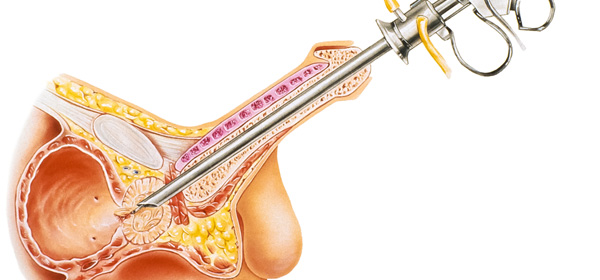Around one in three Australian men over the age of 50 years have some urinary issues. In most cases, these symptoms are due to a blockage caused by an enlarged prostate.
If the inner part of the prostate gland obstructs the urethra during urination, this will irritate the bladder and cause urinary issues.
Urinary issues may include:
- problems with starting urination
- reduced flow
- frequent urination, particularly at night
- urgency and possible urgency incontinence
- passing drops of urine involuntarily after you think you’ve finished
- blood in the urine – although this can never be assumed to be due to the prostate until other causes have been excluded.
A transurethral resection of the prostate (TURP) is the surgical removal of part of the prostate gland. It is one option available to relieve the symptoms of an enlarged prostate or other benign (non-cancerous) prostate disease. It is by far the most common of the surgical procedures used for benign prostate disease.
TURP is sometimes referred to as a ‘re-bore’. It involves inserting a slender instrument through the urethra into the bladder.
Only the middle part of the prostate is removed to allow you to pass urine more easily.
TURP is used most often for non-cancerous blockage, but may also be used in some cases of prostate cancer. The average hospital stay is three to four days.
Side effects
While surgery can improve symptoms dramatically, TURP can have significant unwanted side effects. You should discuss the pros and cons of both medical management and surgery with your doctor before you make a decision.
Common side effects after surgery include:
- Bleeding after the operation – this usually reduces over time and should stop after four weeks.
- Retrograde ejaculation – after surgery to treat an enlarged prostate, most men are able to have erections and orgasms. However, they may not ejaculate because the bladder neck is removed along with prostatic tissue. This causes the ejaculate to collect with urine and pass out in the next urination.
Less common unwanted effects of surgery include:
- Urinary symptoms do not change – sometimes surgery does not cure your urinary problems. Even though the blockage has been cleared, the bladder irritability may continue and you may still have symptoms such as being unable to empty your bladder completely and nocturia (passing urine more than twice during the night).
- Erectile dysfunction (impotence) – after surgery, some men are unable to get or maintain an erection sufficient for sexual intercourse. This is more of a problem for men who had erectile difficulties before their operation. This problem may be treated by medication.
- Urethral strictures – when scarring occurs in and around the urinary tract, it can cause further blockage to urine flow. Strictures may need to be dilated or need further surgery.
- Urinary incontinence – sometimes surgery results in being unable to hold or control the flow of urine. This may be due to continuing bladder problems or, less often, to sphincter muscle damage.
For more information visit betterhealth.vic.gov.au
Related articles:
Prostate cancer patients misled
How prostate cancer affects sex
Detect prostate cancer early

